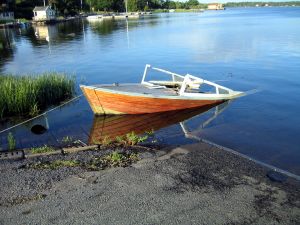It was just last week when your Charleston auto accident lawyers commented on a couple of boat accidents in South Carolina, and between the time that that entry was being thoroughly thought through and written and now, there were two more boat accidents reported across our wonderful State. But, unlike like the last entry concerning boat accidents, the ones discussed today do not feature uplifting accounts of successful rescues, rather they deal with the consequences one could face if deciding to boat under the influence of alcohol (BUI).
The accidents will be discussed in the order that they occurred. Late last Friday, a Batesburg-Leesville couple crashed their boat into a dock on the south shore of Lake Murray, southwest of Dreher Island State Recreation Area. The collision killed both the operator and the passenger of the boat. But, it was determined by authorities, and reported by The State, that both the operator and passenger had drank enough to be well over the limit considered legally impaired when operating a boat (blood-alcohol content (BAC) above 0.08). According to the Lexington County Coroner, preliminary tests show the driver’s BAC was at 0.357 and the passenger’s at 0.187.
The second incident, unlike the first, happened along South Carolina’s coast when the Coast Guard responded to a distress call alerting them that three people had gone overboard and into Charleston Harbor early Sunday morning. Responding rescuers discovered that a 21-foot recreational boat had hit a channel marker in the Harbor and sent its three occupants into the water. Two of the three boaters sustained injuries, including a broken arm and a head injury, and after being pulled from the water were taken to Medical University Hospital. Also on scene was the Charleston County Sheriff’s Office and the South Carolina Department of Natural Resources. These agencies conducted interviews and determined the operator was in excess of the legal blood-alcohol level. The operator of the boat was arrested for BUI. Incidentally, the allegedly intoxicated operator did not suffer any injuries as a result of his collision with the channel marker.
As we have seen over the last week South Carolina boating accidents are an unfortunate yet fairly common occurrence, but the operation of watercraft after sunset greatly increases the chances of a potential incident. A United States Coast Guard report states that boat on boat collisions are the largest cause of injury on the water. In case it was unclear, both of the above mentioned accidents occurred in the dark of night.
In South Carolina boat operators can be cited for BUI if their blood-alcohol content is above 0.08, but boaters can be cited for BUI when deemed intoxicated by a field sobriety test with a blood alcohol-level between 0.05 and 0.08. It’s rare that a sober boat operator is involved in a serious boating accident, but there have been instances of drunk boaters crashing into bridges, jetties, and other boats. Boating under the influence is not only illegal, but also dangerous. Penalties for operating a boat over the said legal limit can include fines, imprisonment, impoundment of your boat, and revocation of boating privileges, as well as loss of driving privileges.
The fatal accident on Lake Murray is the first in almost 15 months. The last accident occurred back in May 2010 when two late-night collisions took four lives, sparking a serious crackdown on reckless boating. But, officials say it is not more fatal boating accidents they need to keep safety awareness high, rather more patrolling officers can curb reckless behavior such as speeding and heavy drinking, in turn curbing the number of serious injuries and deaths.
But, there seems to be a lack of manpower and resources to keep a large number of patrolling officers on the water. Increasing fuel costs require agencies to conserve expenses and cut down on patrolling boats. It just goes to show how interconnected our modern society and economy has become. Our reliance on scarce, expensive resources, like fuel, directly effects the safety of summer boaters across South Carolina.


